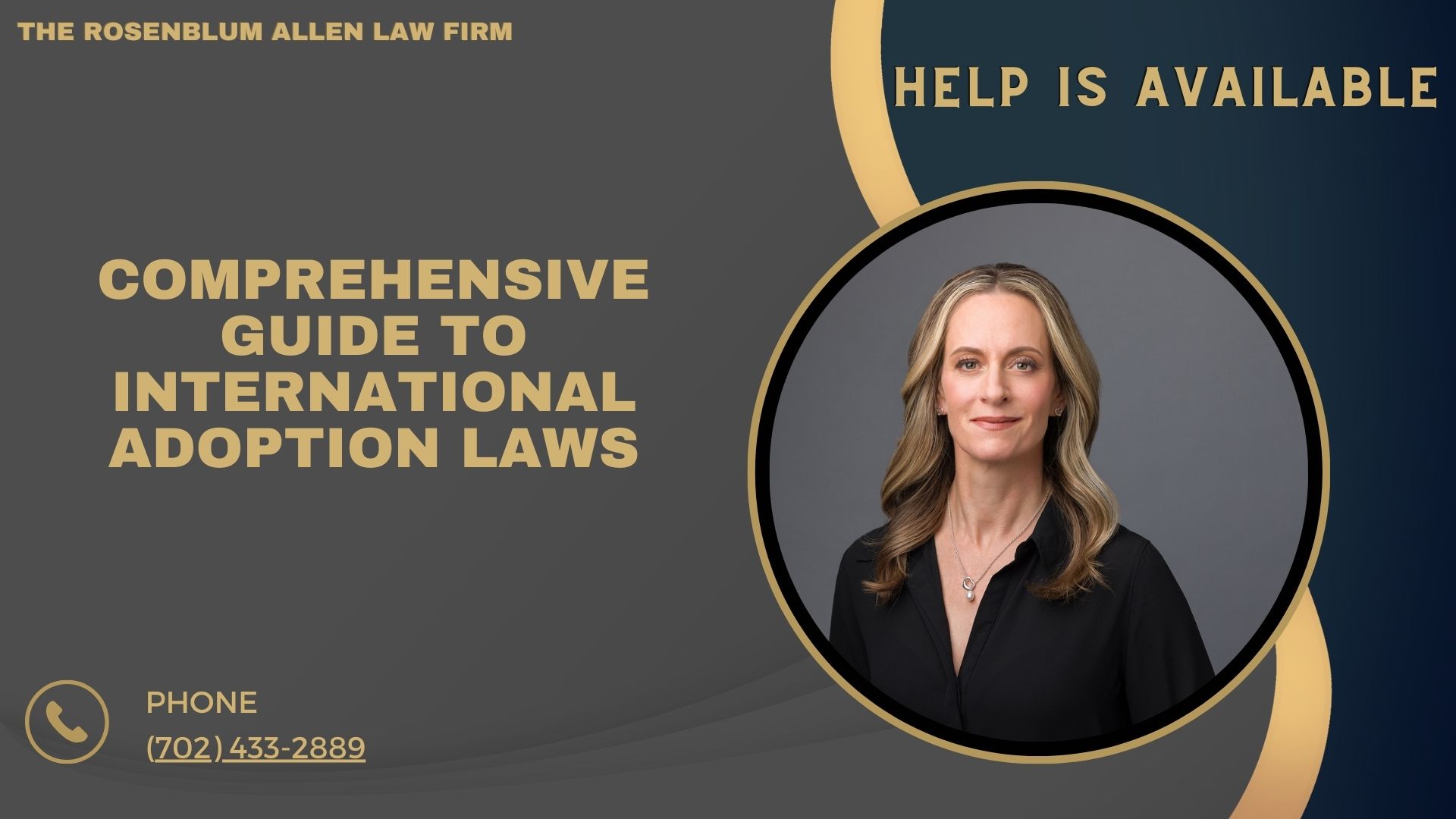Starting international adoption is a big and life-changing decision. It is full of excitement and challenges. Understanding the legal landscape is crucial for prospective adoptive parents. This guide is comprehensive. We explore the intricate world of international adoption laws. We will give you the knowledge. It will help you navigate this complex process with confidence.

Understanding International Adoption Laws
International adoption is the legal process of adopting a child from one country. It is also called intercountry adoption. Then, you bring them to another country. There, they become a permanent adoptive family member. To understand international adoption laws comprehensively, consider the following key aspects:
Definition of International Adoption
International adoption is the legal process. It lets individuals or couples become parents to a child born in a different country. It helps the child to immigrate and join their new family and country.
International adoption is different from domestic adoption. It involves following the laws of both the sending and receiving countries. The sending country is where the child is born. The receiving country is where the adoptive parents live.
Legal Framework of International Adoption
International adoption operates within a complex legal framework. It includes treaties between nations. It also includes the laws and rules for each country.
The Hague Convention is key in adoption law. It covers international adoptions. It establishes guidelines and standards for intercountry adoption among its signatory countries.
The convention is about protecting children and cooperating on international adoption.
The Hague Convention aims to ensure that intercountry adoptions put the child first. They also must respect the child’s fundamental rights.
The Hague Convention has key provisions. They include the creation of central authorities in each signatory country. Those authorities will oversee adoption. They also include promoting transparency and accountability. And they aim to prevent child abduction, sale, or trafficking for adoption.

Factors Influencing International Adoption Laws
Many factors influence international adoption laws. They shape the legal landscape and procedures. It’s crucial for prospective adoptive parents to understand these factors:
Country-Specific Regulations
Each country has distinct adoption laws and regulations governing the adoption process. These regulations encompass eligibility criteria, adoption procedures, and documentation requirements.
Prospective adoptive parents must research the adoption laws. They must research the laws of the country from which they plan to adopt. They must do this to follow the law.
Immigration Laws and Visa Requirements
Immigration laws are key in international adoption. They set the process for the adopted child to enter the adoptive parents’ country.
Adoptive parents must navigate visa rules and immigration procedures. They do this to help their child legally immigrate and join their new family and country.
Home Country Regulations
The adoptive parents’ home country has its own regulations on international adoption. These regulations encompass eligibility criteria, home study requirements, and post-adoption reporting obligations.
Prospective adoptive parents should learn their home country’s adoption laws. They should ensure they follow them during the adoption process.

Challenges and Considerations
International adoption presents unique challenges and considerations that need careful consideration.
Legal Risks and Challenges
International adoption has many legal complexities. These include bureaucratic hurdles, cultural differences, and potential delays.
People looking to adopt should expect unexpected legal obstacles. They should seek guidance from experienced legal professionals to navigate them well.
Ethical Considerations
Ethical concerns may arise. They involve child trafficking, exploitation, and corruption. They happen in international adoption.
Adoptive parents must work with good adoption agencies. They must follow ethical guidelines. This keeps adoption fair. It protects the child’s best interests.
Financial Considerations
International adoption can be costly. It includes adoption agency fees, legal expenses, travel costs, and post-adoption expenses.
Prospective adoptive parents should assess their finances. They should also look into financial help. This includes grants, loans, and adoption subsidies. These can reduce the cost of adoption.

Navigating the International Adoption Process
Successfully navigating the international adoption process requires strategic planning and comprehensive understanding.
Finding an accredited adoption agency
Prospective adoptive parents should carefully research. They should select an accredited adoption agency. The agency should have expertise in international adoption.
Accredited agencies offer invaluable support and guidance. They ensure compliance with laws, ethics, and best practices throughout the adoption journey.
Understanding Adoption Procedures
Learn the adoption procedures for your target country. This includes the necessary documents, timelines, and post-adoption rules.
Get details from your chosen adoption agency or legal counsel. This will help speed up the process and reduce challenges.
Legal Help and Support
Get legal help from experienced adoption attorneys. They specialize in international adoption laws and procedures.
A lawyer knows a lot. They can give full legal advice, review adoption documents, and advocate for you. They make sure the adoption process is smooth and legal.
Hague Convention on Protection of Children and Co-operation in Respect of Inter-country Adoption
The Hague Convention aims to ensure that adoptions between countries focus on the best interests of the child. They must also respect the child’s fundamental rights.
The Hague Convention has key provisions. They include setting up central authorities in each signatory country. These authorities oversee adoption. The provisions also promote transparency and accountability. They prevent abduction, sale, or trafficking of children for adoption.

Breaking It All Down
In conclusion, navigating international adoption laws is complex. It requires careful thought and preparation. They can do this by understanding the law, facing challenges, and seeking support. With this, they can start their adoption journey with confidence. Remember, each step is essential. They protect the child’s best interests and the adoption’s integrity. It takes dedication, patience, and the right resources. International adoption can be rewarding. It can change the lives of the child and the adoptive family.
Resources for Further Information and Help
For more help with international adoption laws and procedures, see these resources:
Adoption Agencies: Accredited adoption agencies specializing in international adoption can provide comprehensive support and guidance throughout the adoption process.
Legal Counsel: Experienced adoption attorneys knowledgeable about international adoption laws can offer legal advice and representation to prospective adoptive parents.
Government Agencies: Contact the central adoption authority or relevant government agencies in your country and the child’s country of origin for information on adoption regulations and procedures.
Support Groups: Join adoption support groups and online forums to connect with other adoptive parents, share experiences, and access valuable resources and information.
Books and Publications: Explore books, articles, and publications on international adoption to deepen your understanding of the adoption process and legal considerations.
Remember to approach adoption with openness. Be flexible and committed to providing the child with a loving, supportive home. With dedication and perseverance, you can navigate the complexities of international adoption. You can build a beautiful family bond that crosses borders.

Frequently Asked Questions
What is international adoption?
International adoption, or intercountry adoption, is the legal process. It’s how people adopt a child from a different country. They bring the child to their own country. There, the child becomes a permanent family member.
What are the legal considerations involved in international adoption?
International adoption operates within a complex legal framework. It includes international treaties, national laws, and rules for each country. These apply to the adoption process. You must understand and obey these laws. They are essential for a smooth adoption.
How does the Hague Convention impact international adoption?
The Hague Convention sets guidelines for intercountry adoption. It applies to its signatory countries. It aims to put the child’s best interests first. It also aims to prevent the abduction, sale, or trafficking of children for adoption.
What factors influence international adoption laws?
Many factors influence international adoption laws. These include country-specific rules, immigration laws, and visa requirements. Additionally, the rules of the adoptive parent’s home country also matter. Understanding these factors is crucial for prospective adoptive parents.
What are some challenges and considerations in international adoption?
International adoption has unique challenges. These include legal risks, ethical considerations, and financial implications. Prospective adoptive parents should recognize these challenges and seek appropriate support and guidance.
How can prospective adoptive parents navigate the international adoption process?
They can find an accredited adoption agency. They can learn about adoption procedures. They can prepare for a home study and gather the necessary documents. They can also seek legal help and support.
Where can I find more information and help on international adoption?
For more help on international adoption laws and procedures, contact adoption agencies. Also, contact lawyers who specialize in adoption law. Also, reach out to government agencies and support groups. Also, check out books and publications on international adoption.

Glossary
International Adoption is the legal process through which individuals or couples adopt a child from a different country and bring them to their own country to become a permanent member of their family.
Hague Convention on Protection of Children and Co-operation in Respect of Inter-country Adoption (Hague Convention): This international treaty sets guidelines and standards for inter-country adoption among its signatory countries. It aims to prioritize the best interests of the child and prevent the abduction, sale, or trafficking of children for adoption purposes.
Accredited Adoption Agency: An adoption agency that has been officially recognized or accredited by relevant authorities to facilitate adoptions and ensure compliance with legal requirements, ethical standards, and best practices.
Home Study: An assessment conducted by a licensed social worker or adoption agency to evaluate the suitability of prospective adoptive parents, including their home environment, background, and readiness for adoption.
Documentation Requirements: The paperwork and documents required for the international adoption process may include birth certificates, marriage certificates, financial records, and medical reports. These documents need to be accurate, up-to-date, and properly authenticated.
Visa Requirements: The legal requirements for obtaining a visa to facilitate the adopted child’s entry into the adoptive parents’ country. This involves navigating visa application procedures and fulfilling immigration requirements.
Legal Assistance: Legal guidance and support provided by adoption attorneys specializing in international adoption laws and procedures. This includes reviewing adoption documents, advocating for the adoptive parents’ interests, and ensuring compliance with legal requirements.
Ethical Considerations: There are moral and ethical principles that govern international adoption, including concerns such as child trafficking, exploitation, and corruption. Adoptive parents must work with reputable adoption agencies and adhere to ethical guidelines to ensure the integrity of the adoption process.
Financial Considerations: The financial costs associated with international adoption, including adoption agency fees, legal expenses, travel costs, and post-adoption expenses. Prospective adoptive parents should carefully assess their financial resources and explore available financial assistance options.
Central Adoption Authority: A governmental agency or authority designated by each signatory country to the Hague Convention to oversee adoption procedures, promote transparency, and ensure compliance with the convention’s principles.

Additional Resources for You
For those seeking additional legal support, our lead attorney, Molly Rosenblum Allen, Esq., has developed a range of specialized resources to meet your needs:
Las Vegas Custody Attorney: If you’re navigating child custody issues in Las Vegas, our team is here to provide effective legal guidance and representation.
Fathers Rights: Learn about your rights as a father in custody and visitation matters with our comprehensive resource on fathers’ rights.
Supervised Visitation: Understand the ins and outs of supervised visitation arrangements and how they may impact your family dynamics.
Changing Custody Agreement: If you need to modify an existing custody agreement, our team can help you navigate the legal process effectively.
Grandparents Rights Nevada: Discover your rights as a grandparent in Nevada and explore options for maintaining a meaningful relationship with your grandchildren.
Long Distance Co-Parenting: Get practical tips and advice for co-parenting from a distance while prioritizing your child’s well-being.
How a Mother Can Lose a Custody Battle: Understand common pitfalls and mistakes that mothers may make in custody battles to better protect your parental rights.
Custody Battle Tips for Nevadans: Access valuable tips and strategies for navigating a custody battle in Nevada and achieving a favorable outcome.
What Not To Say In Child Custody Mediation: Learn which statements to avoid during child custody mediation to prevent potential negative impacts on your case.
How Much is a Custody Lawyer: Understand the factors that may influence the cost of hiring a custody lawyer and budget accordingly for legal representation.
Types of Custody in Las Vegas: Explore the different types of custody arrangements available in Las Vegas and determine which option may be best for your family.
Nevada Child Custody Laws: Gain insight into Nevada’s child custody laws and regulations to better navigate your custody case with confidence.

Outside Resources for You
American Bar Association (ABA): The ABA provides a wealth of information on family law, including articles, publications, and resources for individuals navigating custody and adoption issues.
Child Welfare Information Gateway: This resource offers comprehensive information on child welfare laws, policies, and practices, including resources specific to adoption and foster care.
National Council For Adoption (NCFA): NCFA is a nonprofit organization that provides education, advocacy, and support for all aspects of adoption, including international adoption.
National Association of Counsel for Children (NACC): NACC offers resources and support for legal professionals, advocates, and families involved in child welfare and adoption cases.
Child Welfare League of America (CWLA): CWLA is a leading organization dedicated to improving the lives of children and families through advocacy, research, and resources on child welfare issues.
Dave Thomas Foundation for Adoption: This foundation provides resources and support for foster care adoption, including information on adoption subsidies, post-adoption support, and finding adoptive families for waiting children.
National Center for State Courts (NCSC): NCSC offers resources and publications on family court procedures, including information on child custody, visitation, and adoption laws at the state level.

A Special Message from Our Lead Attorney, Molly Rosenblum Allen, Esq

Thank you for taking the time to explore our resources. I hope you found them helpful in navigating your legal concerns. Please reach out if you have more questions or need help. You can schedule a free consultation by calling (702) 433-2889. We’re here to support you every step of the way.


